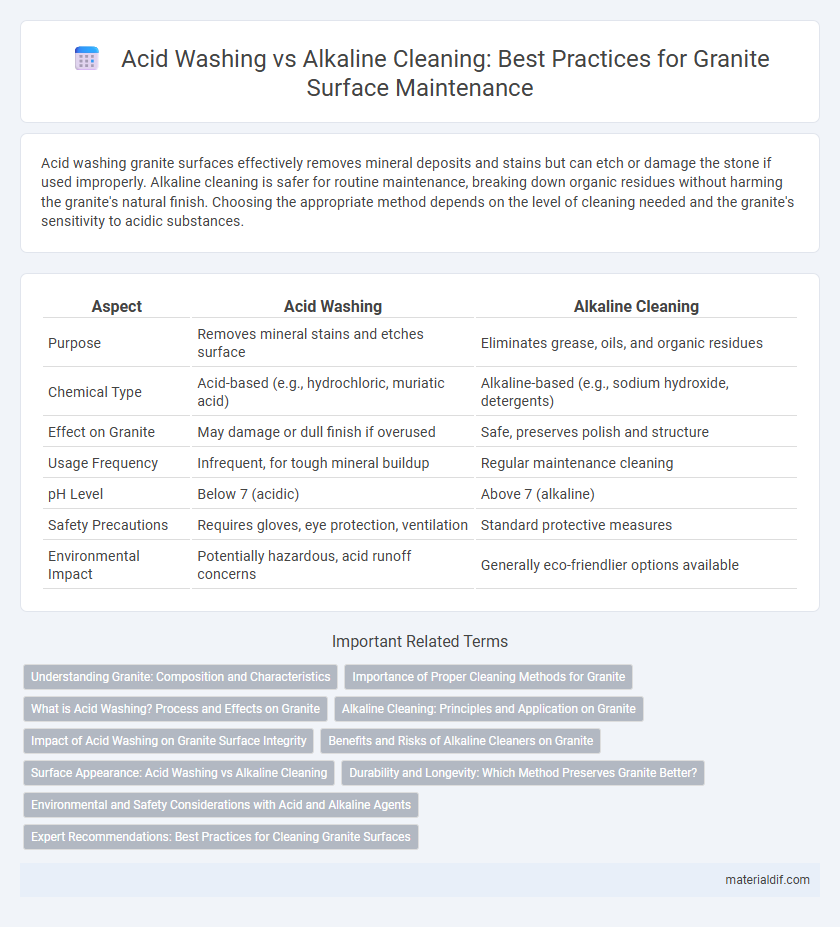Acid washing granite surfaces effectively removes mineral deposits and stains but can etch or damage the stone if used improperly. Alkaline cleaning is safer for routine maintenance, breaking down organic residues without harming the granite's natural finish. Choosing the appropriate method depends on the level of cleaning needed and the granite's sensitivity to acidic substances.
Table of Comparison
| Aspect | Acid Washing | Alkaline Cleaning |
|---|---|---|
| Purpose | Removes mineral stains and etches surface | Eliminates grease, oils, and organic residues |
| Chemical Type | Acid-based (e.g., hydrochloric, muriatic acid) | Alkaline-based (e.g., sodium hydroxide, detergents) |
| Effect on Granite | May damage or dull finish if overused | Safe, preserves polish and structure |
| Usage Frequency | Infrequent, for tough mineral buildup | Regular maintenance cleaning |
| pH Level | Below 7 (acidic) | Above 7 (alkaline) |
| Safety Precautions | Requires gloves, eye protection, ventilation | Standard protective measures |
| Environmental Impact | Potentially hazardous, acid runoff concerns | Generally eco-friendlier options available |
Understanding Granite: Composition and Characteristics
Granite is an igneous rock composed primarily of quartz, feldspar, and mica, which gives it a durable yet porous nature requiring careful maintenance. Acid washing can damage granite surfaces by reacting with feldspar and causing etching or dullness, whereas alkaline cleaning is safer as it neutralizes acidic residues and removes organic stains without harming the stone. Proper understanding of granite's mineral composition highlights the need for pH-balanced cleaners to preserve its natural luster and structural integrity.
Importance of Proper Cleaning Methods for Granite
Proper cleaning methods for granite are crucial to maintain its natural beauty and durability, as acid washing can cause etching or dullness due to granite's sensitivity to acidic substances. Alkaline cleaning solutions, specifically formulated for stone surfaces, effectively remove dirt and oils without damaging the granite's sealant or surface integrity. Using the appropriate pH-neutral or alkaline cleaners extends the lifespan of granite countertops and preserves their polished finish.
What is Acid Washing? Process and Effects on Granite
Acid washing granite involves applying a diluted acid solution, often containing hydrochloric acid, to remove stubborn stains, mineral deposits, and etching from the surface. This process can effectively brighten and restore dull granite but poses risks such as surface damage, erosion, and discoloration if not properly neutralized or used excessively. Granite's natural composition reacts with acids by dissolving calcium-based minerals, making acid washing suitable only for specific stain removal and requiring professional application to preserve the stone's integrity.
Alkaline Cleaning: Principles and Application on Granite
Alkaline cleaning on granite surfaces involves using a high pH solution to effectively break down grease, oils, and organic residues without damaging the stone's natural structure. This method relies on saponification, where alkaline agents react with fats and oils, transforming them into water-soluble substances that can be easily rinsed away. Proper application includes selecting pH-balanced cleaners specifically designed for granite to maintain surface integrity and prevent etching or discoloration.
Impact of Acid Washing on Granite Surface Integrity
Acid washing on granite surfaces can significantly degrade the stone's integrity by etching and dulling the polished finish, leading to increased susceptibility to stains and surface damage. Unlike alkaline cleaning, which is gentler and preserves the natural hardness and luster of granite, acid solutions can break down the mineral composition, causing long-term structural weakening. Proper maintenance with pH-neutral or alkaline cleaners is essential to maintain granite's durability and aesthetic value.
Benefits and Risks of Alkaline Cleaners on Granite
Alkaline cleaners effectively remove oils, grease, and organic stains from granite surfaces without causing etching or dulling, preserving the stone's natural shine. These cleaners enhance longevity by maintaining the granite's protective sealant, reducing the risk of damage caused by harsh acids. However, overuse or improper dilution of alkaline solutions can lead to residue buildup and potential discoloration, necessitating careful application and thorough rinsing.
Surface Appearance: Acid Washing vs Alkaline Cleaning
Acid washing on granite surfaces can enhance natural patterns by removing mineral stains and etching superficial layers, but it risks dulling the stone and causing surface erosion if overused. Alkaline cleaning preserves granite's polished finish by effectively dissolving oils, grease, and organic residues without compromising the stone's integrity or gloss. Choosing alkaline cleaning maintains the granite's luster and protects its surface texture, while acid washing requires caution to avoid irreversible damage.
Durability and Longevity: Which Method Preserves Granite Better?
Acid washing can etch and damage granite surfaces over time, compromising their durability and reducing longevity by wearing down the stone's protective sealant. Alkaline cleaning, being gentler, effectively removes grime without deteriorating the granite's natural strength or causing surface erosion. For preserving granite's durability and extending its lifespan, alkaline cleaning is the preferred maintenance method.
Environmental and Safety Considerations with Acid and Alkaline Agents
Acid washing granite surfaces involves the use of strong acids such as hydrochloric or sulfuric acid, which pose significant risks including toxic fumes, skin burns, and environmental harm due to acid runoff affecting aquatic ecosystems. Alkaline cleaning agents, typically containing sodium hydroxide or potassium hydroxide, offer a safer alternative with lower volatility and reduced toxicity, though improper disposal can still lead to soil and water alkalization. Choosing alkaline cleaners over acids reduces health hazards for workers and minimizes ecological damage while maintaining effective maintenance of granite's natural appearance.
Expert Recommendations: Best Practices for Cleaning Granite Surfaces
Expert recommendations for cleaning granite surfaces emphasize using alkaline cleaners rather than acid washing due to granite's sensitivity to acidic substances, which can etch and dull the stone's natural finish. Alkaline cleaning solutions, typically pH-neutral or slightly basic, effectively remove dirt and grease without damaging the surface or compromising sealant integrity. Professional guidelines suggest avoiding acidic agents such as vinegar or lemon-based cleaners to maintain granite's durability and aesthetic appeal over time.
Acid washing vs Alkaline cleaning (on granite surfaces) Infographic

 materialdif.com
materialdif.com